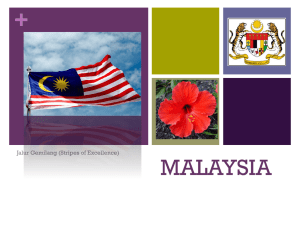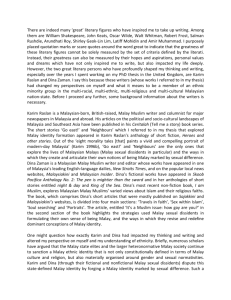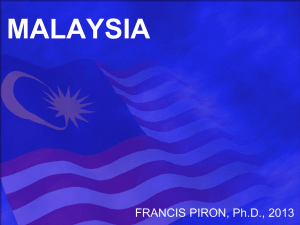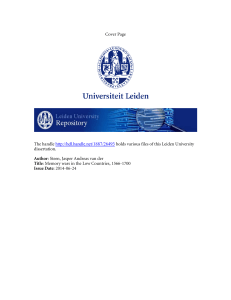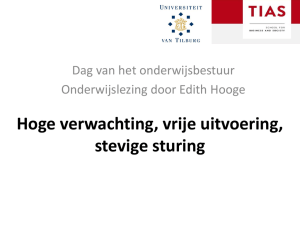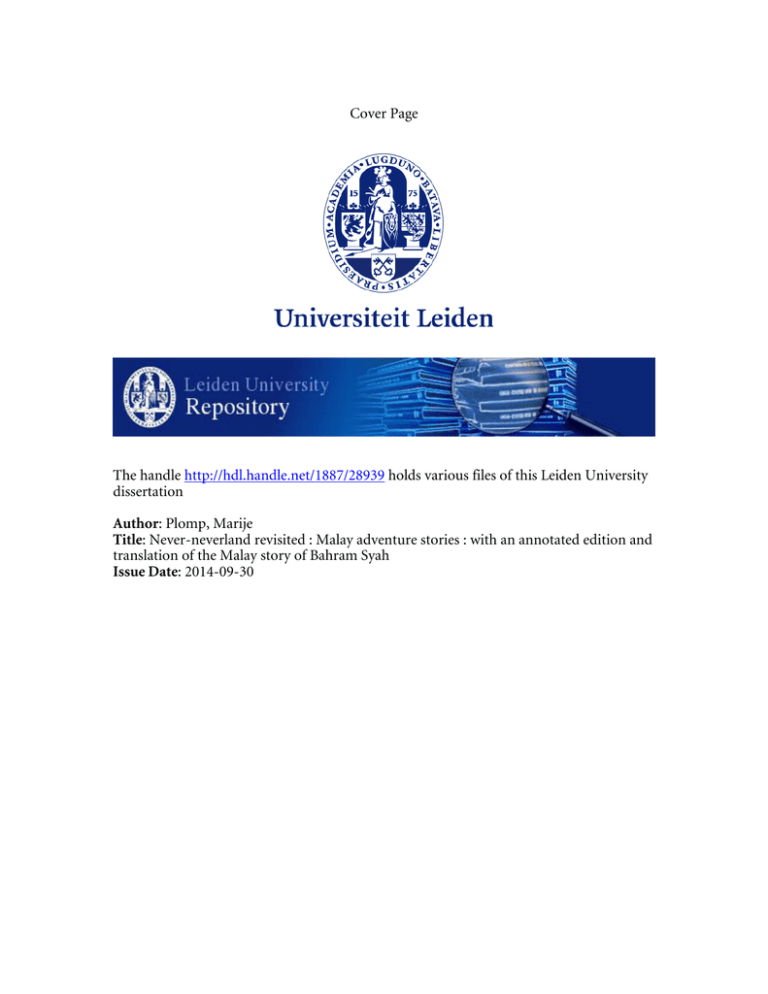
Cover Page
The handle http://hdl.handle.net/1887/28939 holds various files of this Leiden University
dissertation
Author: Plomp, Marije
Title: Never-neverland revisited : Malay adventure stories : with an annotated edition and
translation of the Malay story of Bahram Syah
Issue Date: 2014-09-30
-
Never-Neverland Revisited
Marije Plomp
Cover design: Marije Plomp
Cover illustration: An Acehnese man, c. (KITLV )
Typesetting: Zink Typografie, www.zinktypografie.nl
Printing: Ridderprint BV, Ridderkerk
© Marije Plomp,
All rights reserved. No parts of this publication may be reported or transmitted, in any form or by any means,
without permission of the author.
Never-Neverland Revisited
Malay Adventure Stories
With an Annotated Edition and Translation of the Malay Story of Bahram Syah
ter verkrijging van
de graad van Doctor aan de Universiteit Leiden
op gezag van de Rector Magnificus prof. mr. C.J.J.M. Stolker,
volgens besluit van het College voor Promoties
ter verdediging op dinsdag september
klokke : uur
door
Marije Plomp
geboren te Amsterdam, Nederland
in
Promotores
Prof. dr. E. J. van Alphen
Prof. dr. H. M. J. Maier, University of California, Riverside
Leden van de promotiecommissie
Prof. dr. D. E. F. Henley
Prof. dr. W. van der Molen, Universitas Indonesia, Depok
Prof. dr. P. E. Spyer
The research for this dissertation was financed by the Netherlands Organisation for Scientific Research
(NWO/WOTRO). Facilities were kindly provided by KITLV/Royal Netherlands Institute of Southeast
Asian and Caribbean Studies.
Acknowledgements
I boarded this boat years ago, without a course in mind. I had learned how to raise the
sails and where to find the wind, and thus felt confident enough to head out to the open
sea. The winds blew and I sailed. The winds changed direction, and so did my boat. After
a while, I realized that there was more joy to be derived from sailing. So I set a course
and tried to follow it, only to abandon it shortly after. The destination did not seem
to make sense. Then came the long calms, and I had to lay down the mainsheet and
halyards. Changing currents carried the ship along. When the wind picked up again, I
was prepared: I had several courses to test. Now, I have found the destination that suits
me best. Looking back, it was not the arrival that I enjoyed the most; it was the lightness
I experienced when the boat was being semi-lifted from the water while I was keeping
course.
There are many people who have helped me during my journey, in various ways.
Firstly, my supervisors Ernst van Alphen and Henk Maier. I persevered with this project,
partly due to Henk’s unwavering belief in me. The times that he questioned my focus in
certain passages of the text are greatly appreciated and kept me alert. Without Ernst, this
dissertation would not have been finished. When I was in sight of the harbour, he guided
me through the shallow waters to my destination. Yet, he gave me enough room to manoeuvre and to gain the confidence that I needed to steer this endeavour to completion.
Discussions with (former) fellow PhD students helped to focus my research and
writing. I thank Koos Arens, Els Bogaerts, Betty Litamahuputty, Ariel Lopez, and Maya
Sutedja-Liem for their expert advice, continuous encouragement and friendship. Next, I
have had the privilege to meet a number of inspiring researchers at my former workplace,
NIOD Institute for War, Holocaust and Genocide Studies in Amsterdam: Benien van
Berkel, Eveline Buchheim, Iris Heidebrink, Kuniko Forrer, Madelon de Keizer, Peter
vi
•
Acknowledgements
Keppy, Remco Raben and Aukje Zuidema. Their passion for historical research steered
me out of the calms and I resumed my research activities during my time at NIOD.
Since the early days of my studies in Leiden, the KITLV has been a steady beacon in my
professional life. Willem van der Molen, Yayah Siegers-Samaniri, Henk Schulte Nordholt, Ellen Sitinjak and Kathryn Wellen have been especially important, practically and
substantively. Then, there is the KITLV reading room, where I have been a regular visitor for the last years. Its closure, on June is more than unfortunate. I thank
Rini Hogewoning, Josephine Schrama, Nico van Rooijen, and Alfred Schipper for their
excellent service and the warm welcome I always received. I wish you all the best in your
new jobs. Suryadi (Leiden University) and Deni Wiliadi from the Indonesian School
in Wassenaar lent me a hand with translations from Minangkabau and Acehnese. It was
interesting to see how Deni became fascinated with his own regional narrative tradition
after our cooperation. Although we only walked the same path for a short while, Ann
Rigney of Utrecht University has left her mark on this dissertation. Before we met, my
boat had been adrift for a while. Her commentary on a few of my chapters greatly helped
me to determine my approach to the Malay stories. In Vancouver, Tineke Hellwig waited
patiently for me to finish this work. Her interest in this project has been much appreciated.
I acknowledge and thank my friends and family. My parents and mother-in-law have
always believed that I could finish this work. Moreover, their help with taking care of Max
and Armijn while I was writing this dissertation has been indispensible. My meetings and
travels with my good friends Gloria van Kessel and Mira Kleij during the years I worked
on my dissertation always lifted my spirit. A big thank you to you two! My weekends
at our ‘secret garden,’ the Wilgenborgh, recharged my batteries. Wilgenborgh-people are
special people and very dear to me. My editor Anna Yeadell did a wonderful job; her interventions have helped me create a much more readable text. The look and feel of this book
is the result of the discerning eye of Job and Roel Zinkstok (www.zinktypografie.nl).
And lastly, my partner Arthur de Beer and sons Max and Armijn. Arthur, thank you for
supporting me in this and all my other endeavours. Your patience is limitless. You give
me the freedom to be who I want to be. Max and Armijn: thank you for bearing with me,
the times that I was too busy to tell you it was time to go to bed, or you had to eat pizza
or pancakes (again). Those times are over now.
Contents
Acknowledgements
Abbreviations ix
Malay Words
xi
Dutch Words xv
List of Figures xvii
v
I M A S S
Introduction
The Coastal Trading Town of Barus, North Sumatra, –
Malay Writing in Barus, –
Malay Adventure Stories: ‘Poor Literature’
Man Versus World: Malay Adventure Stories and Malay Ontology
What (Wo)Men Want: Dream Theory in Malay Adventure Stories
Between Faith and Fate: Making Sense of the Story of Bahram Syah
II T S B S: T T
Introduction
Hikayat Bahram Syah
The Story of Bahram Syah
Bibliography
A
A Titles of Malay Writings Present in Barus, -
viii
•
Contents
B Titles of Malay Adventure Stories
Samenvatting
Curriculum vitae Marije Plomp
Abbreviations
BKI
ÉFEO
EHESS
ENI
JMBRAS
KBBI
KITLV
Kl.
MAS
Ms.
NBG
Pam.
SBB
SBS
SDM
SIP
SLB
SMB
PA
SSI
Bijdragen tot de Taal-, Land- en Volkenkunde
École française d’Extrême-Orient
École des hautes etudes en sciences sociales
Encyclopaedie van Nederlandsch-Indië
Journal of the Malaysian Branch of the Royal Asiatic Society
Kamus Besar Bahasa Indonesia ( and )
Koninklijk Instituut voor Taal-, Land- en Volkenkunde
Nieuw Maleisch–Nederlandsch Woordenboek, H. C. Klinkert ()
Malay adventure stories
Dictionnaire Minangkabau, Indonesian–Français, Gérard Moussay ()
Nederlands Bijbelgenootschap (Dutch Bible Society)
Kamoes Bahasa Minangkabau–Bahasa Melajoe–Riau, M. Thaib Sutan
Pamoentjak ()
Story of Banta Beuransah (Hikayat Banta Beuransah)
Story of Bahram Syah (Hikayat Bahram Syah)
Story of Dewa Mandu (Hikayat Dewa Mandu)
Story of Inderaputera (Hikayat Inderaputera)
Story of Langlang Buana (Hikayat Langlang Buana)
Story of Maharaja Bikramasakti (Hikayat Maharaja Bikramasakti)
Story of Panglimo Awang (Panglimo Awang)
Story of Sahrul Indra (Hikayat Sahrul Indra)
x
•
Abbreviations
T.
TBG
VDT
VDTo.
VDW.
VOC
Wl.
Indonesisch–Nederlands woordenboek, A. Teeuw ()
Tijdschrift voor Indische taal-, land- en volkenkunde
Herman Neubronner van der Tuuk
Minangkabausch–Maleisch–Nederlandsch Woordenboek, J. L. van der
Toorn ()
Maleisch–Nederlandsch woordenboek, H. von de Wall (–)
Vereenigde Oost-Indische Compagnie
A Malay–English dictionary, R. J. Wilkinson ()
Malay Words
adat
air mawar
akal
alang-alang
anjung
bahara
bangsi
bawal
bengkunang
bomor
buruk
busuk
ceracap
dadap
dagang
dang
danglak-dangli
datuk
dukun
customary law
rosewater
reason in human beings
a kind of long-leafed grass
outer and raised annex of a traditional Minangkabau house
a weight
Malay musical instrument: flageolet
a kind of fish, pomfret (Stromateus spp.)
the larger mouse deer
traditional healer, shaman
a kind of bird; waterfowl
a weight
musical instrument of the rattle or castanet type; bamboos
beaten together
a kind of tree (Erythrina spp.)
foreigner, trader
honorific title prefixed to the name of certain ladies at the court
generic name for trees belonging to the genera Memecylon and
Anisophyllea
honorific title of a Malay chief
traditional healer
xii
•
Malay Words
garuda
gulai
gulambai
hadith
haji
hajj
hantu
hantu pemburu
hikayat
hikmat
hilir
hulu/mudik
ilmu
jawi
jin
jumpul
kaba
kafir
kampung
kapas-kapas
kapur
kati
kecapi
ketapang
khatib
kijang
kitab
kitab kuning
kitab (takbir) mimpi
kongsi
kulak
giant mythical bird
curry dish
an old and dirty looking male ghost believed to cause fires
‘tradition’: body of literature about the sayings and doings of
the Prophet Muhammad
Muslim pilgrim
pilgrimage to Mecca and Medina
ghost or spirit
a (Minangkabau-)Malay hunter ghost
genre in Malay writing: long prose narrative
charm or object used to manipulate life force (semangat) or
spirits
downstream
upstream
esoteric knowledge
script derived from the Arabic script used for writing Malay
Islamic ghost
a kind of fish: grey mullet (Mugil planiceps)
narrative genre in Minangkabau storytelling
unbeliever, infidel (non-Muslim)
village
a kind of fish: silver bream (Gerres sp.)
camphor
a weight
four-stringed lute
Indian almond tree (Terminalia catappa)
person who delivers the sermon in the mosque during the Friday and Eid prayers
barking deer
book
‘yellow books’: generic name for Islamic textbooks in the Malay
world
Malay dream book
(Chinese) trade association
a measure of capacity
Malay Words
kupang
madrasah
mahang
marah
masuk Melayu
maulana
merantau
momongan
nafiri
nafsu
naga
nama
napuh
negara negiri
negeri
nesba
nyai
pelanduk
penghulu
peranakan
pesantren
pesisir
pikul
pustaha
raja
rapat
rebab
rusa
sampan
sayyid
selamatan
•
xiii
a coin or currency value
Islamic religious school
a kind of plant (Macaranga spp.)
honorific title for the nobility in the area of Padang
to become Malay; to embrace Islam
Arabic term used for addressing learned doctors of the law
Minangkabau diaspora
shallow gong
Malay trumpet
passion, desire
mythical sea snake
one’s name or status
the larger mouse deer
state kettle drum
state
element of an Arabic personal name, often indicating the place
of origin of the individual
domestic servant-cum-concubine of male Dutch colonialists
mouse deer
headman, superintendent
Chinese of mixed descent
Islamic religious school
coastal region
a weight
Batak zigzag books made of hammered tree bark that contain
divinations
title of a Malay chief
meeting, council
Malay violin
deer
small boat
honorific title for individuals who trace their, often mixed, ancestry back to an Arab lineage
commemorative meal
xiv
•
Malay Words
semangat
serdam
serunai
si
sijobang
singiang-ngiang
sukat
suku
sura
sutan
syaikh
syair
tafsir
tahil
takdir
talibun
tambo
tarekat
telempong
tenggiri
tobat
tolak bala
tuanku
wudhu
life force or ‘soul’ that imbues man, animal, plants, water and
earth
musical instrument: a bamboo pipe with a clarinet mouthpiece
Malay clarinet
definite marker in Malay preceding a personal name
a West Sumatran form of sung narrative
In West Sumatra, the Singiang-ngiang is a female ghost who
dwells in the jungle
a measure of capacity
a weight
chapter of the Quran
honorific title for aristocratic men in West Sumatra and Southern Tapanuli
honorific title for Islamic religious teachers
genre in Malay writing: a long narrative poem
interpretation (of dreams, for example)
a weight
divine preordination (Islam)
sung poem popular on Sumatra’s West coast
genre in Minangkabau writing: historical writings relating to
the founding of a state or dynasty
‘Path of the Mystic’, Sufi brotherhood
percussion instrument
a kind of fish: narrow-barred Spanish mackerel
Islamic practice of repentance
to avert danger or harm
honorific title for a Malay ruler
‘small’ ritual bath for Muslims
Dutch Words
controleur
gouverneur
inlandsche raad
kweekschool
landraad
posthouder
resident
colonial government official who assisted the resident
colonial government official who headed the residency of West
Sumatra; until this post was held by a military governor
native council
Kweekschool voor Inlandsche Onderwijzers: Dutch teacher training college
local judicial body installed by the colonial government; its
members were drawn from the local elite
colonial government official lower than controleur, who represented the colonial government in remote areas
colonial government official who headed a province
List of Figures
Maps: a. Sumatra and the Malay peninsula; b. The Barus region
Colophon of Cod. Or.
First page of Cod. Or.
Draft of a pawn letter by copyist Haji Abdul Wahid in Sorkam, page
Colophon of Cod. Or. containing the Story of Bahram Syah
Note with a message ascribed to Haji Abdul Wahid, presumably to Van der
Tuuk

